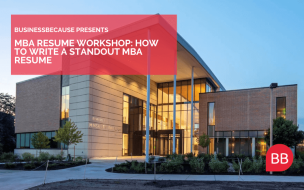The fact that, at HKUST Business School, where Sean now works as director of MBA programs, nearly 30 nationalities are represented in a smaller cohort of 120 students, would have had him doing a full gymnastic routine.
HKUST's MBA was the first Asian program to be listed in all the major rankings, and currently sits pretty as the best program on the continent according to the Financial Times. Costing $75,000 (USD), graduates from HKUST's MBA can expect to be making on average over $143,000 three years after graduating.
Going into his fourth year running the school's MBA programs, Sean has played a key part in bolstering the international reputation of their full-time program, and is now driving to create more and more student-centric experiences, with becoming Asia’s top business school the ultimate goal.
What makes the HKUST MBA unique?
For us, we’re Asia’s most international program, both in terms of students at 93% and faculty. Most of our academics were trained at the best schools in the world, and as such we’re the only Asian school that ranks highly in terms of research.
We also have great practitioner faculty, and are becoming very student-centric. I myself always operate an open-door policy, and that’s a firm part of our culture now.
What do you look for in MBA applicants?
We look for resiliency. Sometimes, working in Hong Kong can be very tough, so you can’t come here with too much pride. You’ve got to be tenacious and sniff out opportunities. Even though you won’t earn as much here for the first few years as you would in America, you’ll get promoted faster, and we welcome people who value those long-term gains over immediate returns. We’re also looking for people who are comfortable being outside of their own culture, capable of interacting with anyone on the course.
How do you work with your corporate partners?
We’ve had to become better at really explaining to companies the benefits of hiring an MBA as opposed to an undergraduate. It’s all about communicating better with these companies, building relationships, and helping them find the right students. For example, if a company like Facebook comes to us, in the past they might have simply picked an investment banker, whereas now we’d direct them to the president of the tech club, providing a more tailored experience.
What international opportunities are present on the HKUST MBA?
We have about 60 exchange program partners from all over the world, the latest ones having been signed with Mexican and Brazilian schools. We’re also part of the Global Network for Advanced Management, and we facilitate our own shorter study trips. We’re also able to leverage our corporate connections to set us up with their operations in other countries.
What do your students get up to in their free time?
For a young person, I don’t think there’s a more vibrant city than Hong Kong. From a career point, networking is fantastic because it’s such a transient place – I often find myself going for a coffee with someone I just met on the street, whereas that could never happen in America.
The nightlife is fantastic as well, but one often-underappreciated thing about Hong Kong is the beauty of its nature. It appeals to both urban-dwellers and lovers of the outdoors. It’s also very cheap and easy to fly out and experience other parts of Asia.
How do you support MBA student entrepreneurs?
Being a science and technology university with over 1000 patents, we’re trying to link our MBA students with the science and engineering graduate students, so every year we have a mixer for this.
We’ve added lots of entrepreneurship courses, but unlike most schools we’re focusing on what comes after the business plan, like how you manage a small organization, leadership and governance, and so on. We also focus on case competitions and business competitions.
Do a lot of your MBA graduates go on to work in Hong Kong or Asia?
There are plenty of opportunities here in Hong Kong and in other parts of Asia, although China have gone internal with their hiring in recent years. I’d say around 85% of our students stay in the region after graduating.
It’s more difficult to make a triple jump here and we have a more risk-averse culture, but lots of schools including HKUST are increasingly helping students settle in and learn what success in China is and how it differs to the rest of the world.
How does the HKUST MBA incorporate online learning, and what does it mean for the future of the program?
At the moment, we’re testing different things to see how they might work in the program, having made a lot of successful revisions to our online offering over the last couple of years.
I think that in the future, full-time MBA programs will change, as cohorts will become younger because more experienced people will choose part-time executive programs instead. Our students have an average right now of five years work experience, but I can see this dropping in the future. Online learning will play a role in this, but I don’t see it threatening the future of the MBA.
How do Asian MBA programs differ from those in America?
Most of the schools here in Asia have a colonial legacy, but since HKUST is younger we have more of an American feel. However, we don’t have the same sort of rah-rah camaraderie that you’ll find in some schools stateside. We also operate a 16-month MBA as opposed to the two-year programs in America, which I think works better for the students.
What plans do you have for the future with regards to the HKUST MBA?
We want to be the clear leader in Asia, and become a top ten consensus school. For us, that means becoming even more student-centric, especially at the post-degree level. Corporate partnerships will also be a key focus for us, and we need to continue to make sure we don’t have any major gaps in our program.
RECAPTHA :
1c
4e
d9
f3







